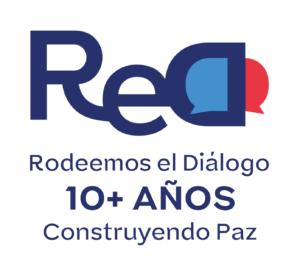Conversatorio 8 en Bath-Inglaterra
Conversatorio Número 8
The 8th conversation in the series ‘Conversatorios de Paz – Rodeemos el Diálogo’ (ReD), and the first on a projected tour of ReD events outside of London, was held on 25th July, 2014 at the University of Bath. Bath received the speaker Francy Carranza[1] and moderator Peter Cousins[2] to discuss the ‘Demobilisation and Reintegration of Ex-combatants in Colombia.’ This event was attended by a multinational audience including people from Argentina, Britain, Mexico and Nigeria, as well as Colombia.
Some attendees had a direct link to Colombia and others a particular interest in the country as a case study with regards to other places experiencing internal conflict. To bring everyone up to speed, the speaker gave a brief account of the conflict after its beginnings in the 1950’s.
Francy drew a rough chronological map of the conflict illustrating the most significant events throughout its history such as the formation of the FARC in 1964 by partisans after the civil war; the formation of the ELN, EPL, M-19 CRS and Quintín Lame guerrillas in the 70’s and their demobilisation between 1985 and 1991 which led to an increase in the violence. Paramilitary groups that were backed up by drug dealing cartels saw their uprising in the 90s, ousting the guerrillas and gaining control of one third of the Colombian territory and of congress. These events played a decisive role in the election of Alvaro Uribe as president for two terms (2002-2006 and 2006-2010). In 2003, the paramilitary groups were engaged in the biggest demobilisation process in Colombia.
The conversation then centred on the processes of reintegration of the paramilitary ex-combatants and guerrilla members persuaded to demobilise by a successful governmental campaign of benefits for deserters. Figures were allegedly doubled by the government – official figures reported about 31,000 paramilitary ex-combatants demobilised from a total number of about 15,000 paramilitary soldiers. The percentage of success of the demobilisation programmes in Colombia is reported to be about 80%, indicating a very low rate of ex-combatants returning to criminal bands or other forms of criminality. Several factors are thought to contribute to the successful demobilisation rate including financial benefits, psychological attention and family ties (since many combatants have family members on both sides of the conflict).
It was also highlighted that paramilitary and guerrilla groups frequently take advantage of the most vulnerable people in society to recruit soldiers, being common practice for them to enrol children as young as 11 years old from rural communities. Therefore, very young people are amongst those reintegrating with society, requiring appropriate education and training towards employment. This further highlights the important role of institutions such as schools and health services which provide a support platform for the demobilised people. Another problem that ex-combatants face is the difficulty to integrate back into society, leading to a tendency for ex-combatants to establish relationships in a very closed circle of fellow ex-combatants or even former enemies.
Additionally, successful demobilisation programmes have been reported in the cities of Medellín and Bogotá which are the two main urban clusters in Colombia, and have accordingly received the highest number of forcedly displaced people. However, the lack of support for the local government at national level is noticeable: lack of investment and poor leadership among mayors are factors that hinder the development of these projects and their replication in smaller cities.
During the conversation, themes such as the agrarian reform, drug trafficking and political participation, which are key points of the ongoing peace negotiations in Havana, Cuba, were discussed. Although the main theme of the conversation was the experience of the DDR (Disarmament, Demobilisation and Reintegration) processes in Colombia, everyone in attendance appreciated the basic need for the details of the conflict to be understood before solutions to the problem could be proposed. All members of the audience participated in the discussions and were very engaged with the subject such that the Conversation could have continued far beyond the timeframe of the event.
[1] PhD candidate, SOAS (University of London)
[2] Mediator/conciliator



